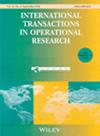Evaluating input‐ and output‐specific inefficiency in courts of justice. An empirical study of Polish district courts
IF 3.1
4区 管理学
Q2 MANAGEMENT
引用次数: 0
Abstract
Efficient judicial systems are acknowledged to benefit economic growth, firm competition, entrepreneurship, and financial market development. The goal of this paper is to measure the relative technical inefficiency of Polish district courts for the period 2017–2021 in civil, criminal, and family cases. Unlike other papers on justice (in)efficiency, this study uses input‐specific and output‐specific production models combined with the Data Envelopment Analysis technique. This approach allows for assessment of the contributions of specific inputs and outputs to overall court inefficiency. The results show considerable differences in inefficiencies with regard to courts’ specific inputs and outputs and the types of cases being processed. The evidence shows that the greatest inefficiency is found among court workers (i.e., other judicial staff and judges), while among judges, it is civil judges, with this result being robust to the model's specification. According to the results, the year 2020 marked a clear increase in the inefficiency of almost all variables, which can be attributed to the Coronavirus Disease 2019 (COVID‐19) pandemic and restrictions on the functioning of the courts. Finally, the results also highlight a heterogeneity among courts depending on their geographical location and size, with courts related to the largest cities and those of large size tending to be the most inefficient.评估法院在投入和产出方面的低效率。对波兰地区法院的实证研究
高效的司法系统被认为有利于经济增长、企业竞争、创业精神和金融市场发展。本文旨在衡量 2017-2021 年期间波兰地区法院在民事、刑事和家庭案件中的相对技术低效率。与其他关于司法(低)效率的论文不同,本研究采用了特定投入和特定产出的生产模型,并结合了数据包络分析技术。通过这种方法,可以评估特定投入和产出对法院整体效率低下的影响。结果显示,法院的具体投入和产出以及处理的案件类型在效率低下方面存在很大差异。证据显示,法院工作人员(即其他司法人员和法官)的效率最差,而法官中的民事法官效率最差,这一结果对模型的具体说明是稳健的。结果表明,2020 年几乎所有变量的低效率都明显上升,这可归因于 2019 年冠状病毒病(COVID-19)的流行和对法院运作的限制。最后,研究结果还凸显了法院之间因地理位置和规模不同而存在的差异,与最大城市相关的法院和规模较大的法院往往效率最高。
本文章由计算机程序翻译,如有差异,请以英文原文为准。
求助全文
约1分钟内获得全文
求助全文
来源期刊

International Transactions in Operational Research
OPERATIONS RESEARCH & MANAGEMENT SCIENCE-
CiteScore
7.80
自引率
12.90%
发文量
146
审稿时长
>12 weeks
期刊介绍:
International Transactions in Operational Research (ITOR) aims to advance the understanding and practice of Operational Research (OR) and Management Science internationally. Its scope includes:
International problems, such as those of fisheries management, environmental issues, and global competitiveness
International work done by major OR figures
Studies of worldwide interest from nations with emerging OR communities
National or regional OR work which has the potential for application in other nations
Technical developments of international interest
Specific organizational examples that can be applied in other countries
National and international presentations of transnational interest
Broadly relevant professional issues, such as those of ethics and practice
Applications relevant to global industries, such as operations management, manufacturing, and logistics.
 求助内容:
求助内容: 应助结果提醒方式:
应助结果提醒方式:


